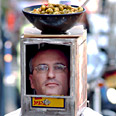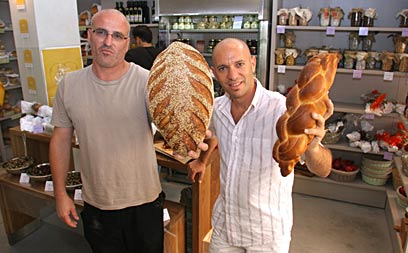
Famous baker: My breads are my children
Most famous Israeli baker talks about his passion for fresh, unique bread. Meet Erez Komrovsky, man that made sourdough and yeast fashionable
Sitting in his store on Tel Aviv’s Ibn Gvirol Street, Erez Komrovsky, founder and owner of the “Lehem Erez” chain of boutique bread shops, sees a long-time customer. Without hesitating she accosts him with a complaint: “In Paris, people get used to eating the bread they love, and they can get it even 30 years later. Here that’s not the way it works. You no longer make the bread I love. Why?”
Komrovsky defends himself: “I came to baking with the perspective of a chef. As a chef you’re always changing the menu. Obviously there’s a seasonal menu. In the spring you cook with asparagus and squash, in the summer there are prickly pears and watermelon, and in the winter there is orange juice and kohlrabi. As a baker the same thing goes. Obviously I’m not going to bake tomato bread in the winter because I don’t use tomatoes unless they are good.”

Erez (left) with Ilan Rom (Photo: Abigail Uzi)
When the woman has gone, he continues: “The world is divided into two kinds of people: those who need change, and those who can’t stand change. Personally, I really need change. I’m very much in favor of change. Sometimes you just get tired of things and need to move on.”
Melting pot of breads
For 15 years Komrovsky was the chef for a catering company called “Erez’s Cooking Studio.” In 1989 he settled in San Francisco, where he discovered breads that were a lot more involved than those he’d dealt with while studying cooking.
“We were used to spongy bread with a shelf life of three weeks, and suddenly boutique bakeries were popping up. In California, as opposed to France, they don’t only have local breads. It’s a melting pot there, which means you can find Spanish bread, Portuguese bread, and Italian bread. My partner and I got addicted to sourdough bread, which is served with oyster soup. We used to eat it every day. It was a revelation for me that you can make bread into something incredible.”
When Komrovsky returned to Israel five years later he came to a crossroad in his life. He was torn between life in the central Tel Aviv apartment where he was born, and the pastoral life of a settlement in Western Galilee.
“I can get more excited by seeing things growing in the fields than by reading Anna Karenina, which is a book I really love,” notes Komrovsky, yet he ultimately chose to live in the city and open a business.
From small bakery to successful chain
Ten years ago he established “Lehem Erez” with Ilan Rom. He started with a bakery in Herzliya, and a year later he opened a restaurant next to the bakery. By the time he’d opened another three stores the bakery had become too small, so it was moved to Netanya. Today the chain has 22 stores; ten of them opened this year.
“We’re not a factory, we’re a bakery,” says Komrovsky. “Every bread is shaped by hand. Every cookie is rolled out by hand. All our biscotti are cut by hand.”
And still, the chain sells over twenty types of bread (the most popular is the French country bread - sourdough bread made with whole flour), some 15 types of cakes (the carrot cake is the most popular), pastries, cookies, spreads, and wine.
The importance of “Lehem Erez” should not be underestimated: The company brought the concept of gourmet bread to Israel. By setting such a high standard, “Lehem Erez” became a symbol of Tel Aviv’s refined tastes and pretensions.
“I come from the French tradition of haute cuisine,” explains Komrovsky. “I didn’t choose to open a restaurant; I chose to open a bakery whose breads provide a culinary-gastronomic experience at a relatively low price compared to other breads. That’s not how things were 20 years ago. Today you go to the supermarket and special sliced breads cost the same as our breads. I think that we’re very inexpensive.”
Komrovsky doesn’t eat breakfast at home. At 6:30 a.m. he goes to the gym and after burning some calories, he goes to the Ibn Gvirol store and eats toast, a croissant, or an apple pastry.
“Every day I taste. I’m always eating carbohydrates. I go to the bakery and taste breads, go to the bake shop and taste cakes, go to the kitchen and taste cold cuts and cheeses. I don’t have any free time. I want to slow down the pace so I can enjoy life. I hope to be able to create more quiet time, more relaxation for myself because that’s when I get the best ideas. I’ve already fulfilled my dream. I don’t want any more. I don’t want money. I was well off before 'Lehem Erez,' and I am well off today. That’s not my issue. I’m a strange bird: I don’t look at the company books. The bank never calls, and everything is fine.”
Would you like a child?
“I have seven nephews. They’re all boys. I don’t have children of my own. I’m already 44. I’m not sure that I'd have the strength today to run after a small baby. There was a period in my life when I wanted a child. Today I’ve begun to realize that perhaps my children are my breads. What I leave behind won’t be my genes, but my recipes. It’s funny that I’m not yet old, but I talk about my legacy.
"I think that a person can live a happy life even if he isn’t a parent. There’s a fashion among gays to adopt the heterosexual model of being parents with children. I almost got into that, but in the end I didn’t. I’ve chosen another life, a life in which there’s a lot of freedom, a lot less obligation, although I’ve had a partner for twenty years.
“My partner tried to have a child, but the woman he did it with had a miscarriage after three months, and he was a bit broken up by it. I always felt that I didn’t want to have a child. I wanted to adopt, because I said that in a situation like mine, the result of love is not a child. We can’t physically create a child. A woman has to be in the picture. There would be three parties, which would create an imbalance in the couple. Another reason to adopt is that there are a lot of unfortunate children in the world, and if I can give a child a warm home, a better life than he’d have had if he’d stayed in an orphanage. Ultimately, we didn’t do anything about it.”










